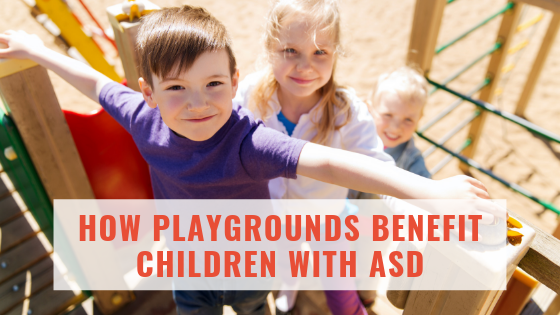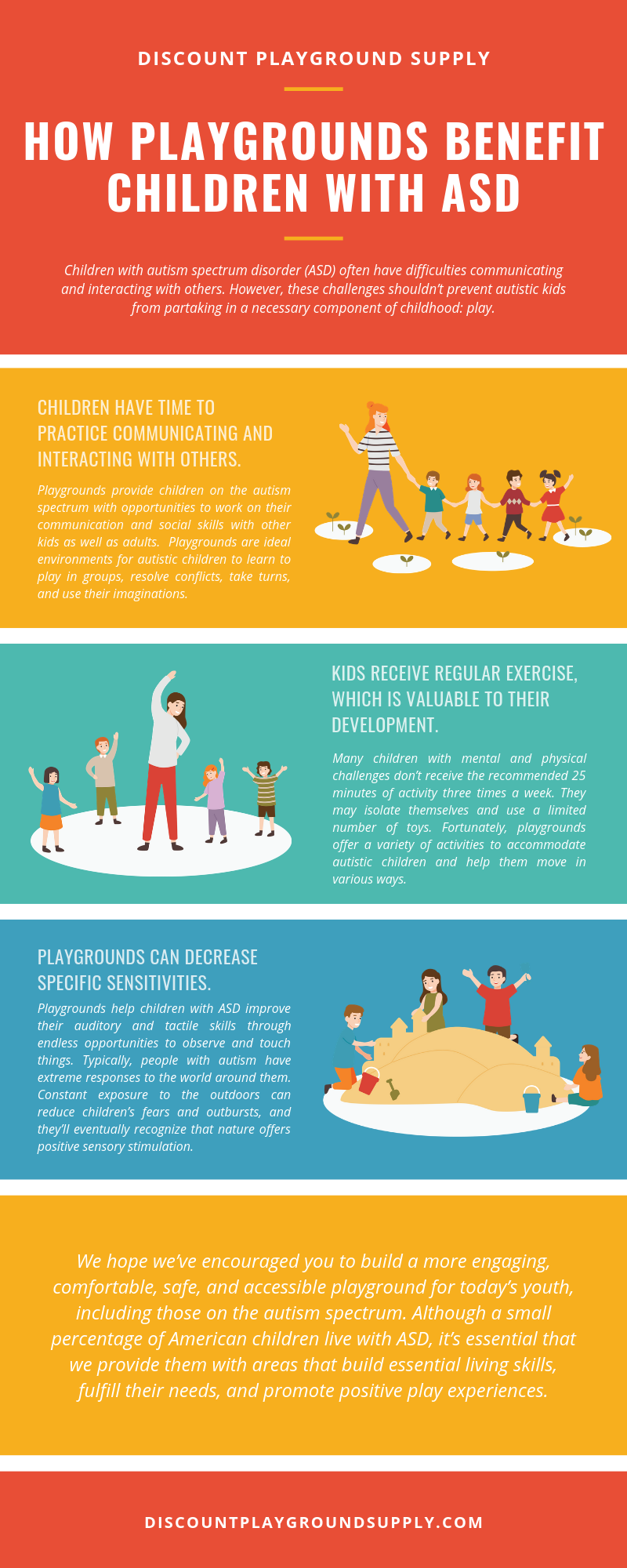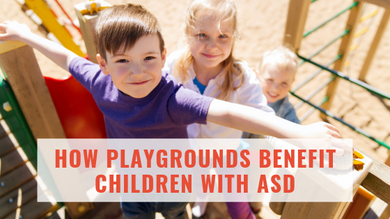
Children with autism spectrum disorder (ASD) often have difficulties communicating and interacting with others. However, these challenges shouldn’t prevent autistic kids from partaking in a necessary component of childhood: play. Play is essential for cognitive and physical development, and playgrounds provide a myriad of benefits for children on the autism spectrum. Below,we uncover how playgrounds benefit children with ASD as well as what you can do to best accommodate this group of kids.
Children have time to practice communicating and interacting with others.
Playgrounds provide children on the autism spectrum with opportunities to work on their communication and social skills with other kids as well as adults. While many children can mostly be left to develop these critical skills on their own, autistic children often have to be taught how to effectively communicate and socialize. Playgrounds are ideal environments for autistic children to learn to play in groups, resolve conflicts, take turns, and use their imaginations.
Like other children, autistic kids can still feel loneliness, but playgrounds make it easy to play and develop friendships. Outside of playgrounds, children with ASD may have a difficult time approaching other children in their age groups. Perhaps this is because they have fewer interests, prefer solitary play, or don’t understand other children’s intentions. But as long as the environment offers structured activities for autistic kids to participate in, they can feel included during play.
Playgrounds can also help autistic children learn to appropriately comment on their surroundings. When outdoors, adults can give them the opportunity to talk about the numerous objects found in nature.For example, the adult can reference birds, bugs, flowers, and other natural elements and give the child the opportunity to respond in kind. Therefore, they’ll be able to practice speaking about a variety of different things and gradually increase their vocabulary. They’ll also learn how to respond to changes in natural environments, such as growing animals and plants or, on a larger scale, changes in seasons.
Kids receive regular exercise, which is valuable to their development.
Many children with mental and physical challenges don’t receive the recommended 25 minutes of activity three times a week. Simply put, autistic children need play, but they play differently from other kids. Typically, children with ASD don’t interact in spontaneous free play—instead, they play in distinct ways.They may isolate themselves and use a limited number of toys, or they may consistently repeat behaviors. Fortunately, playgrounds offer a variety of activities to accommodate autistic children and help them move in various ways. A sedentary lifestyle can worsen symptoms, so it’s important for children diagnosed with ASD to regularly participate in different types of physical activity. Like other children, they need the outdoor space to release their pent-up energy in a healthy way.
Playgrounds can also improve kids’ balance and coordination as well as their gross and fine motor skills. Many playgrounds offer squishy surfaces to aid in kids’ balance. They may also have balance beams or other structures that benefit children’s vestibular systems and that encourage concentration on steadiness. Kids can develop these motors skills through many playground activities, such as climbing on jungle gyms, running around, and catching, kicking, and throwing balls. Keep in mind, however, that motor skill development varies as children age; for example, preschoolers have endless energy, allowing them to easily improve their gross motor skills—however, they often don’t have the patience to develop their fine motor skills. Therefore, kids need to have access to a variety of age-appropriate activities that allow them to refine different skill sets.
Playgrounds can decrease specific sensitivities.
Playgrounds help children with ASD improve their auditory and tactile skills through endless opportunities to observe and touch things. But typically, people with autism have extreme responses to the world around them, especially when they’re experiencing new feelings, objects, or people. For example, a children’s sandbox provides a specific sensation, while a slide offers a different one, and so on—and the big crowd of other children is the icing on the cake. For autistic children, the combination of all these sensations can be intense—they feel all their emotions at once, which can be an overpowering experience for them. The fact that they may not be able to accurately or immediately describe how they’re feeling only amplifies their emotions. However, constant exposure to the outdoors can reduce children’s fears and outbursts, and they’ll eventually recognize that nature offers positive sensory stimulation.
In general, natural elements can calm autistic children and help them regain control of their emotions. The cool, comfortable breeze; the crisp, fresh air; and the gentle rustling of the trees is sure to boost positive emotions and minimize negative ones. To help remedy extreme emotional responses, some playgrounds even have designated areas or hidden caves for autistic children to take a few quiet moments to collect their thoughts. Plus, most playgrounds have walking paths or sidewalks around the play area, which allow kids to walk around the playground equipment first and become familiar with it.
We hope this information can assist you in quickly and successfully recognizing common traits in autistic children. Additionally, we hope we’ve encouraged you to build a more engaging, comfortable, safe, and accessible playground for today’s youth, including those on the autism spectrum. Although a small percentage of American children live with ASD, it’s essential that we provide them with areas that build essential living skills, fulfill their needs, and promote positive play experiences. If your playground could use equipment that better supports children with ASD, shop our extensive online selection of high-quality, American-made playground structures and accessories. From handicap swings to spring riders—which simultaneously support solo play and improve gross motor skills—to trapeze rings, which build muscles and improve coordination, we have it all. Plus, we offer everything at affordable prices. Buy online or over the phone today. You can also contact us for more information about how you can transform your local park or school playground to best suit kids of all ages and abilities.


